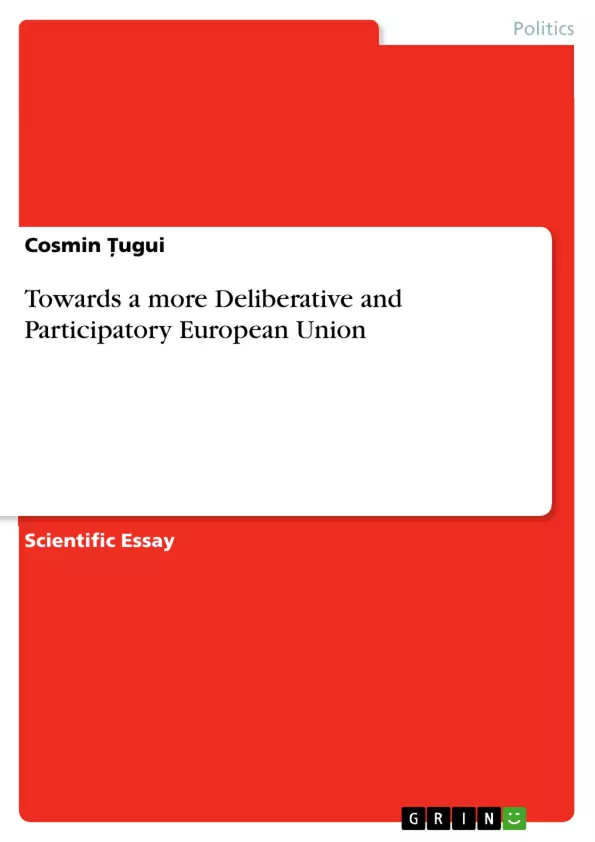Building and consolidating democracy are perennial processes. The European Union fundamentally appears as a community of values assumed and actively promoted by the member states. If values transcend generations, their forms of expression may vary depending on the socio-political framework. The essence of functional democracy lies in permanent cooperation between the state and society, based on responsibility, trust and mutual support. Having said that, numerous studies have shown that, at present, citizens feel systematically removed from the decision-making process, because democratic practices tend to become more and more formal, rigid, and European institutions act without asking for or, sometimes, even in ignoring the opinions expressed in society. The bodies of the Union must encourage civic engagement in all its forms, by developing normative framework conditions intended to encourage the individual desire for involvement of every European citizen. Participatory democracy can be combined with demarchy, representing the drawing of lots of a group of citizens invested with decision-making power on matters of major interest. In an age dominated by the optimism of rational planning, random democratic procedures can help strengthen the legitimacy of representative institutions and rebuild citizens' trust in the political class. In addition to the inherent need for reform that can be found in each member state, at the level of the Union there is also the major problem of Euroscepticism, which can be combated exactly by more sincerely affirming and implementing through new forms the values inscribed in the treaties.
Inhaltsverzeichnis (Table of Contents)
- INTRODUCTORY CONSIDERATIONS
- THE EUROPEAN UNION: BETWEEN ECONOMIC POTENTIAL AND POLITICAL INFRASTRUCTURE
- FROM REPRESENTATIVE TO PARTICIPATORY DEMOCRACY: DELIBERATIVE DEMOCRACY AND DEMARCHY
- CONCLUSIONS
Zielsetzung und Themenschwerpunkte (Objectives and Key Themes)
This text analyzes the current state of democracy in the European Union, exploring the challenges posed by Euroscepticism and the need for greater civic engagement. It argues for a move towards a more deliberative and participatory democracy, proposing the integration of demarchy into the EU's decision-making process.
- The need for greater civic engagement in EU decision-making.
- The challenges of representative democracy and the emergence of Euroscepticism.
- The potential of deliberative and participatory democracy in strengthening the EU.
- The role of demarchy in enhancing democratic legitimacy and citizen trust.
- The importance of a common European identity and the Europeanization of public discourse.
Zusammenfassung der Kapitel (Chapter Summaries)
- INTRODUCTORY CONSIDERATIONS: This chapter introduces the concept of power, highlighting its role in structuring social relations. It discusses Max Weber's definition of transitive power and Hegel's concept of constitutive power, emphasizing the importance of community in shaping power dynamics.
- THE EUROPEAN UNION: BETWEEN ECONOMIC POTENTIAL AND POLITICAL INFRASTRUCTURE: This chapter explores the EU's economic dominance and its potential, contrasting it with its perceived weakness in political infrastructure. It highlights the gap between the economic success of the EU and its lack of political cohesion and a global strategic vision.
- FROM REPRESENTATIVE TO PARTICIPATORY DEMOCRACY: DELIBERATIVE DEMOCRACY AND DEMARCHY: This chapter delves into the limitations of representative democracy, particularly its susceptibility to electoral manipulation and the disconnect between elected representatives and the electorate. It introduces the concept of deliberative democracy and its emphasis on citizen participation and reasoned discourse. The chapter also explores the potential of demarchy, a system of random selection for decision-making, as a way to enhance democratic legitimacy and rebuild trust in the political system.
Schlüsselwörter (Keywords)
This text focuses on the following keywords and concepts: demarchy, representivity, lottocracy, community, engagement, deliberative democracy, participatory democracy, Euroscepticism, European identity, European Union, political institutions, decision-making, civic engagement, legitimacy, trust, and public opinion.
Frequently Asked Questions
What is the main challenge facing democracy in the European Union today?
The main challenges include Euroscepticism and a feeling among citizens that they are systematically removed from the decision-making process due to formal and rigid institutional practices.
What is "demarchy" in the context of European reform?
Demarchy refers to a democratic procedure involving the drawing of lots to select a group of citizens who are invested with decision-making power on matters of major interest.
How can participatory democracy help the EU?
Participatory democracy can strengthen the legitimacy of representative institutions, rebuild citizen trust in the political class, and encourage civic engagement.
What is the difference between representative and deliberative democracy?
Representative democracy relies on elected officials, while deliberative democracy emphasizes reasoned discourse and direct citizen participation in the decision-making process.
What role does European identity play in this process?
A common European identity and the Europeanization of public discourse are seen as vital for creating a cohesive political infrastructure that matches the EU's economic potential.
How does the text view Max Weber's concept of power?
The text discusses Weber's definition of transitive power as part of the introductory considerations on how power structures social relations and communities.
- Quote paper
- Cosmin Țugui (Author), 2023, Towards a more Deliberative and Participatory European Union, Munich, GRIN Verlag, https://www.hausarbeiten.de/document/1363801


